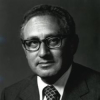Henry A. Kissinger

Henry A. Kissinger
Henry Alfred Kissingeris an American diplomat and political scientist. He served as National Security Advisor and later concurrently as United States Secretary of State in the administrations of presidents Richard Nixon and Gerald Ford. For his actions negotiating the ceasefire in Vietnam, Kissinger received the 1973 Nobel Peace Prize under controversial circumstances, with two members of the committee resigning in protest. Kissinger later sought, unsuccessfully, to return the prize. After his term, his advice has been sought by world leaders...
NationalityGerman
ProfessionStatesman
Date of Birth27 May 1923
CountryGermany
The defining issue is that the government in Taiwan was considered to be the government of all of China, and the authorities in Beijing were not recognized as a government of China. So Taiwan was the residuary for all of China.
America has made it very clear in several administrations that if there is an attack by China on Taiwan, the United States is very likely to resist.
I have great respect for the Taiwanese. They have done an extraordinary job. But it was not a sustainable position to say that the legitimate government of China resides in Taiwan, which at that time didn't have much contact with the mainland.
Certainly nothing is easier than to rewrite history. If we had made Taiwan a separate state, it would have led to a fundamental conflict with China, and probably to war. Certainly in the long term, it would have led to war.
I want to get into the President's head some idea of what he can do. If military actions are recommended to him for decision, I want him to know what he is doing when he decides.
Congress can't do much more damage to us than they already have. To this extent we're liberated to do what is right. ... Our successors will be living in a nightmare if we don't do what is right.
an occasion to blow off their frustrations on an issue on which they didn't look as if they are begging (the United States) for help.
a review of withdrawal strategy ... seems in order.
My heart goes out to the president because I've served in an administration that faced a very divided country in a very difficult set of circumstances.
Because of the axiom that guerrillas win if they do not lose, stalemate is unacceptable, ... the military challenge in Iraq is more elusive.
Ninety percent of all politicians give the other ten percent a bad reputation.
I'm confident John Bolton will bring peace to the world before he brings peace to his relations with The New York Times,
We will go where the facts lead us,
If you don't know where you are going, every road will get you nowhere.